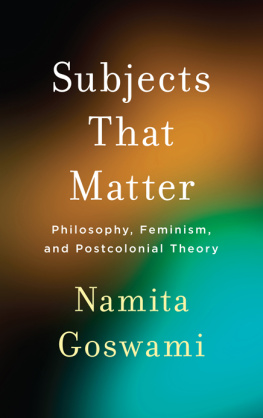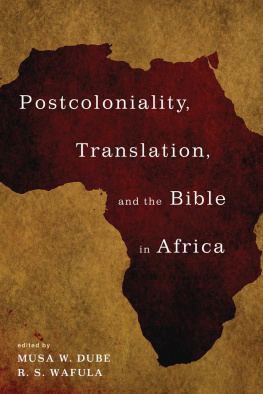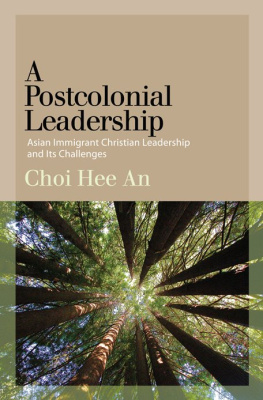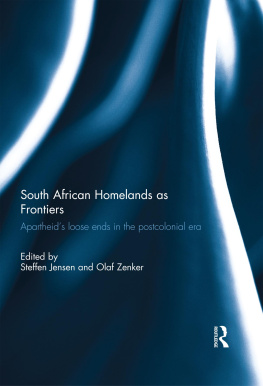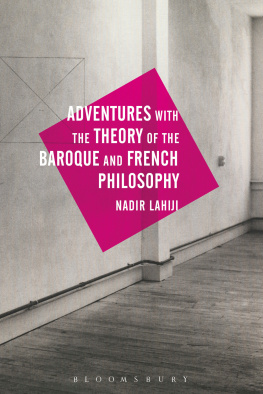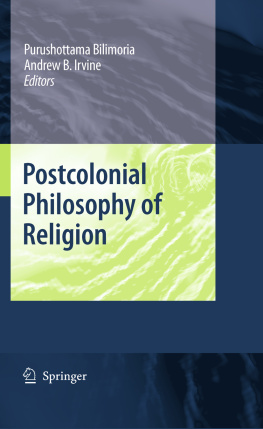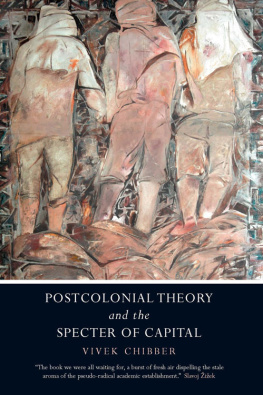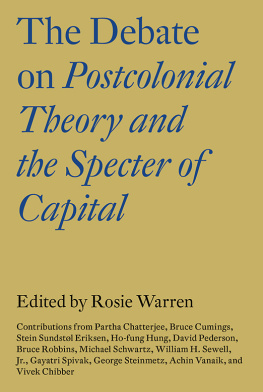SUBJECTS THAT MATTER
SUBJECTS THAT MATTER
PHILOSOPHY, FEMINISM, AND POSTCOLONIAL THEORY
NAMITA GOSWAMI
Published by State University of New York Press, Albany
2019 State University of New York
All rights reserved
Printed in the United States of America
No part of this book may be used or reproduced in any manner whatsoever without written permission. No part of this book may be stored in a retrieval system or transmitted in any form or by any means including electronic, electrostatic, magnetic tape, mechanical, photocopying, recording, or otherwise without the prior permission in writing of the publisher.
For information, contact State University of New York Press, Albany, NY
www.sunypress.edu
Library of Congress Cataloging-in-Publication Data
Names: Goswami, Namita, author.
Title: Subjects that matter : philosophy, feminism, and postcolonial theory / Namita Goswami.
Description: Albany : State University of New York Press, [2019] | Includes bibliographical references and index.
Identifiers: LCCN 2018043673 | ISBN 9781438475677 (hardcover : alk. paper) | ISBN 9781438475684 (ebook)
Subjects: LCSH: Feminist theory. | Postcolonialism.
Classification: LCC HQ1190 .G67 2019 | DDC 305.42dc23
LC record available at https://lccn.loc.gov/2018043673
10 9 8 7 6 5 4 3 2 1
For Papa
Contents
P ART I
H ETEROGENEITY
P ART II
T HE R ESURRECTION OF THE F LESH
Acknowledgments
It is never easy to come to the end of a journey no matter how difficult it might have been. Yet, I am not really certain I can pinpoint when this project began. Inklings of it seem to have always been there while the rest of me needed to catch up. Now that the book is moving into the world, I can only gesture to those who made it possibleyou are part of a lifeworld that cannot be captured on a page. These people buttressed my ability to live to fight another day, often by the skin of my teeth.
If there is a lesson to be learned in any transcribing of what it actually takes for a story to be told, for me, it lies in a paradoxical recognition that this book could not be what it is without being what it was. And so, in the words of Emily Dickinson, Its all I have to bring today / This, and my heart beside.
I want to thank SUNY Press, and in particular, Andrew Kenyon, for standing with this project for more years than I would like to count. His diligence and his faith are irreplaceable. I must add that I am incredibly grateful for SUNYs readers and their invaluable feedback.
If we must assign beginnings, then all of this begins with Richard Werner. His was the first philosophy class I ever took, and it has always stayed with me. Thank you for being my mentor, my teacher, and my friend, when I was a newly arrived international student at Hamilton College. I have also always had excellent brilliant woman karma, and without Chandra Mohanty, Deepika Bahri, Beverly Guy-Sheftall, Cynthia Willett, and Tina Chanter, I would not be who I am today.
A most affectionate nod goes to my former graduate students (you know who you are), including those in my two Spivak seminars and my seminar on postcolonial theory. Some of the material herein was first presented to these students who surprised me every day with their smarts and creativity. I witnessed firsthand their courage, maturity, and ferocious intellect; you will always remain a part of me.
I am indebted to those who held out their hands when it seemed impossible to go further: Charles Mills, Kristie Dotson, Henry Schwarz, Alison Bailey, Jos Medina, Sarah Hoagland, Falguni Sheth, Azadeh Erfani, OD Johnson, Mary Rawlinson, Eric Nelson, Russell Ford, Tommy Curry, Mickaella Perina, Robin James, Tyler Williams, Matt Roberts, Lauren Guilmette, Linda Martn-Alcoff, Emily Lee, Kathryn Sophia Belle, Kyoo Lee, Yitian Zhai, Maeve ODonovan, Lisa Yount, Franklin Perkins, Mary Jeanne Larrabee, and Ann Russo. I miss you, Darrell Moore.
My students at Indiana State University (you also know who you are) show me why we must persist. You made this venture easier with your humor, sincerity, and fortitude. My colleagues at Indiana State University, including those in the Department of Philosophy, the Department of Multidisciplinary Studies, and the College of Arts and Sciences, have always provided the requisite resources and bon homie . Thank you.
So much of life happens as a project comes into being. I must register how my family got me through while also being in the crucible alongside me. There are no words that will ever suffice to impart what Brendan William Corcoran means to me. Without you, I would not be here today. As my partner, best friend, and fellow traveler in every way, your sacrifices, efforts, patience, and love are inestimable. The privilege is all mine. Diarmuid Dhruv Corcoran, there is nothing that makes me prouder and happier than being your mom. Your songs, beaming smile, biting wit, goodness, fierce intelligence, curiosity, kindness, and compassion bring pure joy. You are everything.
Samir ? Thanks for sticking it out with me . My mothers wicked humor, lets-get-on-with-it attitude, and fearlessness helped immeasurably during many an impasse. You were there at every step. I can only hope that I am my mothers daughter. My mother-in-law undauntedly provided unconditional love and taught us all to cherish life. Having come to hold his new grandson a week after he was born, my father-in-law died before holding him ever again. I still hear his bellowing laughter and try to feel gratitude, as he did, for each new day. (Thank you for listening to me and reading my missives as I called to you when exploring Irelands landscapes.)
This book is dedicated to my father who passed away two months before his only grandchild would visit India for the first time. | It is your integrity, untiring discipline, humility, and goodwill that are my example. Although nothing would be better than giving this book to you in person, I know that you always understood. Your sacrifices and love are the bridge this immigrant daughter walks on.
in Hypatia : A Journal of Feminist Philosophy 29:1 (Winter 2014): 6278.
An earlier version of chapter 4 was originally published as in Angelaki: Journal of Theoretical Humanities 13:2 (August 2008): 7391.
An earlier version of chapter 7 was originally published as in Critical Philosophy of Race 1:1 (January 2013): 10420.
An earlier version of chapter 9 was originally published as
Introduction
What Tradition Tells, Tradition Wanted: Subjects That Matter
Views are implicit from the direction taken by the subject-matter itself, its entire freedom to move, and freedom of our thought to follow it.
Theodor Adorno, Why Philosophy
It is the matter that brings us to dialectics.
Theodor Adorno, Negative Dialectics
There are no new ideas. There are only new ways of making them felt.
Audre Lorde, Sister/Outsider
We excel our ancestors only in system and organization: they lied as fluently and as brazenly.
C.L.R. James, The Black Jacobins
The subject matter of this book is heterogeneity. The book uses this subject matter to challenge Eurocentrism, which prevents postcoloniality as a historical era and distinct conceptual accomplishment from truly making a difference in how we understand subjectivity and agency. This interruption of Eurocentric identity politics is oriented by the following three questions: 1. Is it the subject itself or the disciplinary framework that brings this subject matter to lifethat really matters? 2. Does understanding heterogeneity as a common subject matter of philosophy, feminism, and postcolonial theory allow the nonidentitarian value of these disciplines to emerge? 3. Can a conceptual continuity between philosophy, feminism, and postcolonial theory enable a non-antagonistic understanding of difference? I suggest that only by understanding difference as inherently oppositional and antagonistic can Eurocentrism retain hegemonic insistence. Eurocentrisms identitarian value, which prioritizes not the subject matter to be understood but the worth of its practitioners, is used to caricature non-Eurocentric conceptual frameworks as mere politics and ideological advocacy. The book, therefore, considers heterogeneity, which is diversity not dissonance, as a conceptual continuity between philosophy, feminism, and postcolonial theory. It posits this particular conceptual continuity to foreground philosophy, feminism, and postcolonial theorys essentially historical co-implication in understanding the world in which we live. Their nonidentitarian value as disciplinesthat is, the proportionality of their claims to our actual lives, rather than their supposed generalizabilitymakes them subjects that matter.

